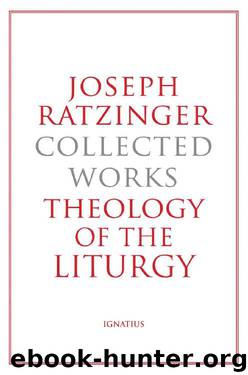Joseph Ratzinger Collected Works: Theology of the Liturgy by Joseph Cardinal Ratzinger

Author:Joseph Cardinal Ratzinger [Ratzinger, Joseph Cardinal]
Language: eng
Format: epub
Tags: Spiritual & Religion
ISBN: 9781681497303
Publisher: Ignatius Press
Published: 2016-11-09T16:00:00+00:00
VI. On the Structure of the Liturgical Celebration*
The crisis in the liturgy (and hence in the Church) in which we find ourselves has very little to do with the change from the old to the new liturgical books. More and more clearly we can see that, behind all the conflicting views, there is a profound disagreement about the very nature of the liturgical celebration, its antecedents, its proper form, and about those who are responsible for it. The issue concerns the basic structure of all liturgy, and, whether we are aware of it or not, two fundamentally different views are involved. The basic concepts of the new view are creativity, freedom, celebration, and community. It sees things like rite, obligation, interiority, and church order as negative factors, belonging to the “old” liturgy that is to be superseded. Here is an illustration, chosen at random, of this “new” view of liturgy:
Liturgy is not some officially prescribed ritual but a concrete celebration, fashioned as an authentic expression of the celebrating community, with the minimum of external control. Liturgy is not a specifically ecclesiastical cult with its own spirituality, to be performed in an objective manner. . . . The priest’s missal is his guidebook for his particular role. . . and in a similar way, Gotteslob [the congregational music book] is the congregation’s guidebook. Liturgy is created in a particular place at a particular time; this emphasizes the role of the community. . . . Since the Council, a higher value has been placed on the congregation’s singing. No longer does the reality exist behind the singing: what is sung is the reality.1
The fundamental idea here is that liturgy is a community celebration, an act in which the community forms and experiences itself as such. In fact this means that the liturgy more and more acquires a “party” character and atmosphere, as we see for instance in the increased importance attached to the words of greeting and dismissal and in the search for elements with “entertainment” value. A “successful” liturgical celebration is judged by the effects achieved in this way. Liturgy is thus dependent on the “creativity”, the “ideas” of those who organize it.
Download
This site does not store any files on its server. We only index and link to content provided by other sites. Please contact the content providers to delete copyright contents if any and email us, we'll remove relevant links or contents immediately.
Resisting Happiness by Matthew Kelly(3337)
The Social Psychology of Inequality by Unknown(3022)
Day by Elie Wiesel(2781)
Designing Your Life by Bill Burnett(2742)
The Giving Tree by Shel Silverstein(2337)
Human Design by Chetan Parkyn(2068)
Angels of God: The Bible, the Church and the Heavenly Hosts by Mike Aquilina(1965)
The Supreme Gift by Paulo Coelho(1963)
Jesus of Nazareth by Joseph Ratzinger(1811)
Hostage to the Devil by Malachi Martin(1802)
Augustine: Conversions to Confessions by Robin Lane Fox(1770)
7 Secrets of Divine Mercy by Vinny Flynn(1741)
Dark Mysteries of the Vatican by H. Paul Jeffers(1718)
The Vatican Pimpernel by Brian Fleming(1700)
St. Thomas Aquinas by G. K. Chesterton(1634)
Saints & Angels by Doreen Virtue(1604)
The Ratline by Philippe Sands(1572)
My Daily Catholic Bible, NABRE by Thigpen Edited by Dr. Paul(1500)
Called to Life by Jacques Philippe(1479)
